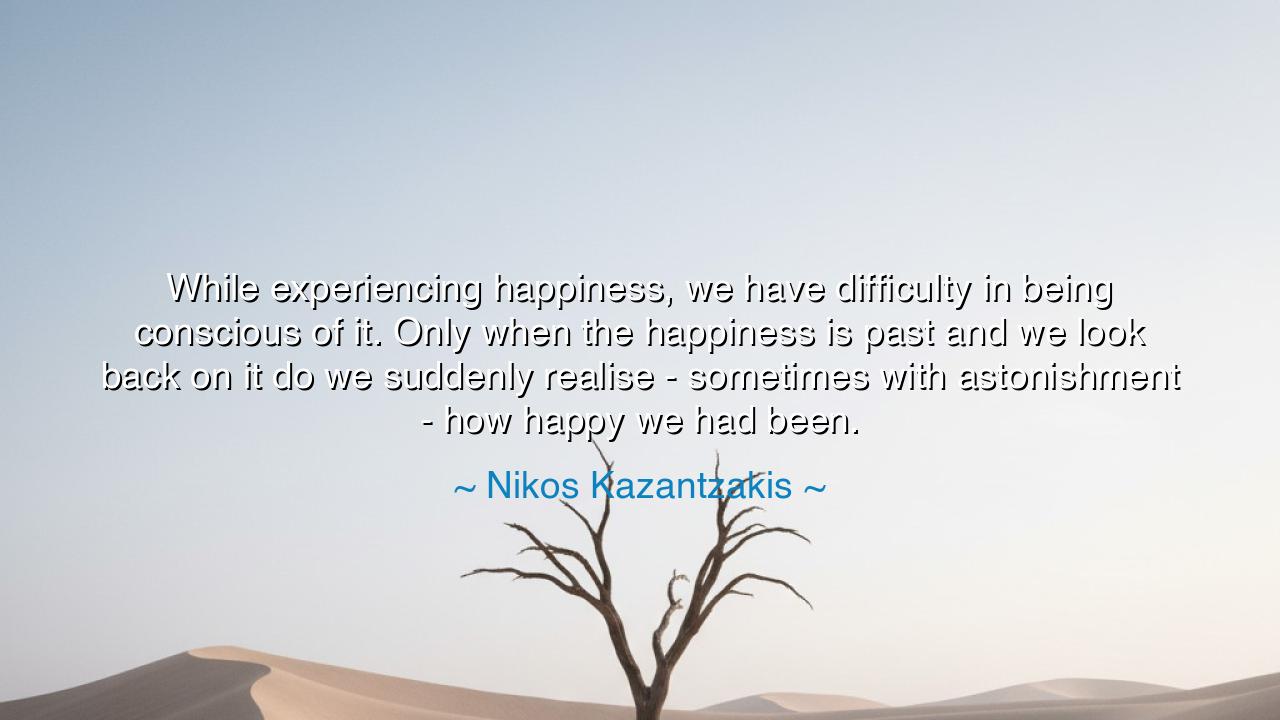
While experiencing happiness, we have difficulty in being
While experiencing happiness, we have difficulty in being conscious of it. Only when the happiness is past and we look back on it do we suddenly realise - sometimes with astonishment - how happy we had been.






“While experiencing happiness, we have difficulty in being conscious of it. Only when the happiness is past and we look back on it do we suddenly realise — sometimes with astonishment — how happy we had been.”
Thus spoke Nikos Kazantzakis, the philosopher and poet of the human spirit, whose words often burn with the fire of both joy and sorrow. In this reflection, he unveils one of the oldest truths known to humankind: that happiness is often invisible while we live it. It flows through our days like sunlight upon our shoulders — warm, radiant, and unnoticed — until the clouds of time cover it, and we look back in longing and say, “Ah, I did not know then how blessed I was.” This is the paradox of joy, that we are most alive when we least realize it, and we most understand its value only when it has slipped quietly from our grasp.
Kazantzakis, born amid the storms of early 20th-century Greece, was a man who lived through war, exile, passion, and constant spiritual seeking. He journeyed through faith and doubt, through poverty and fame, and his writings — from Zorba the Greek to The Last Temptation of Christ — shimmer with the tension between earth and heaven, flesh and spirit. His words about happiness arise from this lifelong struggle to understand the human condition. Having seen the fleeting nature of joy in his own life and in the lives of others, he recognized that happiness is rarely recognized in the moment, for the mind is too restless, too entangled with desire, to pause and see the quiet miracle of its own contentment.
The ancients, too, knew this truth well. The philosopher Epicurus, often misunderstood as a lover of indulgence, taught that happiness lies not in abundance, but in awareness — in savoring the simplest pleasures: a shared meal, a warm breeze, the company of friends. Yet men, he lamented, chase grand dreams and overlook the peace already within their reach. So too does Kazantzakis remind us: while we search for happiness in the far horizons of success, it lives and dies in the present moment, unnoticed like a flower blooming in silence. We wake one day to find the garden of our youth withered, and only then do we realize how fragrant it once was.
There is a story of Anna Akhmatova, the Russian poet who endured exile, persecution, and grief. In her later years, she said that the happiest time of her life had been her impoverished youth, when she and her friends wrote by candlelight and dreamed of beauty amid hardship. Then, she had known only struggle. Only years later, looking back, did she feel the radiance of those days — the laughter, the creation, the hope. Such is the human tragedy Kazantzakis speaks of: we often stand in the midst of paradise and see only the dust beneath our feet. Happiness is rarely felt in its fullness, for it exists too close to the heart to be perceived clearly.
Kazantzakis’s wisdom carries a gentle warning. He calls us not to despair at this blindness, but to awaken from it. He reminds us to live with awareness, to stop and recognize the beauty of ordinary days — the voice of a loved one, the quiet of evening, the gift of breath itself. For happiness is not a future reward; it is a present grace. If we cannot see it now, we will mourn it later as a ghost of memory. To be conscious of joy while it happens — that is the highest art of living, and it requires both gratitude and stillness.
The wise, therefore, cultivate presence. They pause amid their labors and ask, “What is shining here, right now?” They do not wait for tomorrow to call today beautiful. They know that happiness is not a thing to pursue, but a light to notice. They turn their attention to the small wonders that weave the fabric of life — the laughter at the table, the warmth of sun on skin, the silence shared between friends. Such awareness transforms even simple days into sacred time. To be conscious of happiness is to touch eternity within the fleeting.
So, my child, take this teaching to heart: do not let your happiness become something you recognize only in memory. Let gratitude be your mirror in which joy reveals itself. When you wake, thank the dawn; when you work, thank your strength; when you love, thank the heart that beats beside you. Do not rush through the hours in search of greater ones, for all greatness begins in smallness. Remember the words of Kazantzakis, and live as though each moment were already a precious remembrance — for one day, it will be.
And when life grows dim and time stretches its long shadow, you will look back not with astonishment, but with peace, saying: “I saw it. I lived it. I knew my happiness as it came.” This is the true victory of the spirit — not to escape time, but to be awake within it, cherishing every breath of joy before it fades into the echo of memory.






AAdministratorAdministrator
Welcome, honored guests. Please leave a comment, we will respond soon